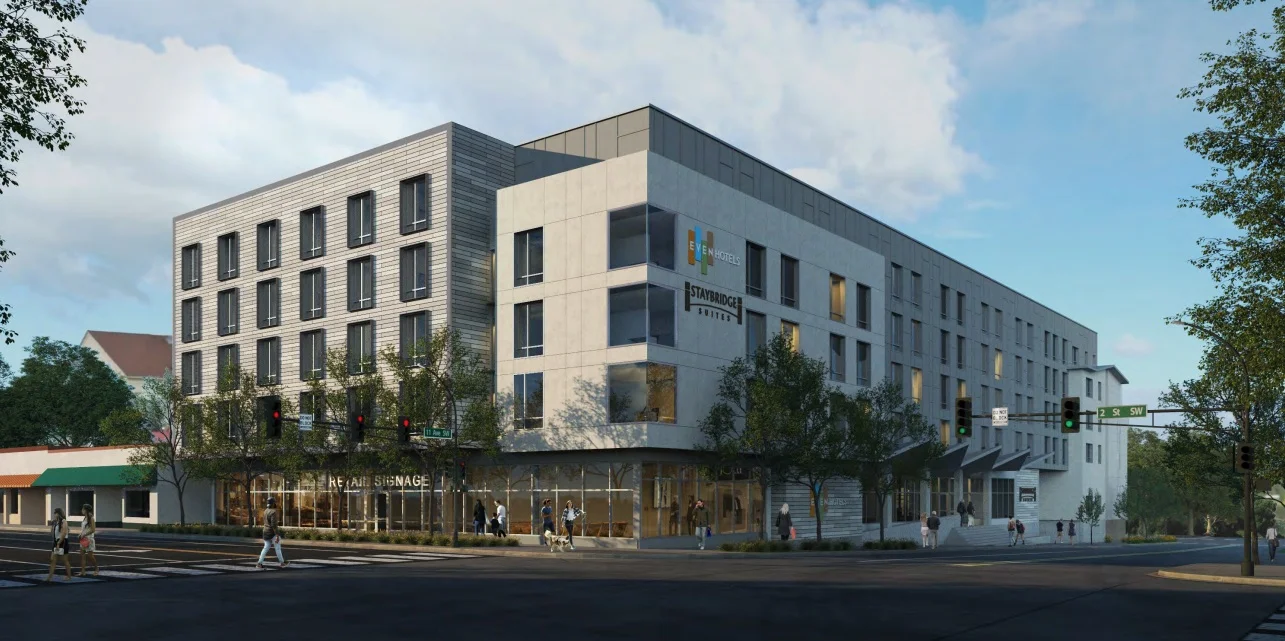Chafoulias seeking millions more in public assistance for Hilton project
Rochester developer Gus Chafoulias wants an additional $6.5 million in city assistance to pay for the nearly-complete Hilton hotel project.
Chafoulias has not yet made a formal request for the funding, but last month he wrote a letter to city officials arguing that greater assistance — in the form of tax increment financing — is warranted in light of increased development costs. He cited the incentive packages given to other Destination Medical Center projects as another justification for the ask.
“By far, Hilton Hotel is your best building and the [tax increment financing] dollars are less than 50 percent of what other projects have received,” said Chafoulias. “Does that make sense to you? Please, ask yourself is that fair. We are only asking to be treated like every other project. Is that so bad?”
Med City Beat obtained the letter this week through the Minnesota Data Practices Act after Council Member Michael Wojcik brought up the existence of the communication at Monday’s Committee of the Whole meeting.
Wojcik, who does not support increasing the city’s assistance, said he had heard that three council members might be in support of the request. His goal, he said, was to find out on the record whether that was the case.
“Based on the response,” of which there was little, “it appears that no council members were in favor,” Wojcik told us this week via email.
Asked whether the request could come to the council for a vote, Council President Randy Staver said it is too early to know. Staver, who received the letter from Chafoulias directly and then forwarded it to city administration, added that at the time of the initial approval, it was not anticipated that the developer would come back with a subsequent or revised request.
He said it would be inappropriate to offer an opinion at this time, but noted that it would require at least two council members bringing it forward.
“I don’t know at this point if an actual request to reconsider TIF will come before the council,” said Staver.
Rationale for the request
The 19-story project, which is being developed by Chafoulias’s Titan Development and Investments along with Chicago-based Harbor Bay Real Estate Advisors, has already received $6.5 million in city assistance for what will be a five-star Hilton hotel with a Pittsburgh Blue Steakhouse.
That incentive package was first agreed upon in May 2015 and then finalized in December 2016. During the months in between, Titan made a number of changes to the project (including a reduction of floors), lost a key investor, and then rebounded with a new plan that included Harbor Bay.
However, according to city administrators, at no time during the various discussions between the developer and the city did Titan representatives make it known that they wanted to amend the level of project assistance.
“We (and the DMC) have discussed this with Gus and Andy [Chafoulias] and have not been supportive of recommending additional TIF,” City Administrator Steve Rymer said in an email to the mayor and council.
Gus Chafoulias, one of the most prominent developers in town, contends he had asked for more assistance early on, but was denied. At the time of the initial talks, the project was slated to be an $80-85 million Embassy Suites.
“In our TIF discussions, we were given an ultimatum of $6.5 million (about 8 percent of the project cost) and were told that is all any developers will be given,” Chafoulias wrote in the letter to the city.
He is now asking for a revised package that would double the amount of assistance awarded to the project to around $13 million. That would put the total incentive package at about 9 percent of the development cost — which Chafoulias said has since risen to $138 million.
Chafoulias noted that an updated agreement would put the project closer in line to what other DMC-approved projects — such as the $230 million Bloom and $115 million Alatus developments — have received.
“I feel the request for additional TIF is extremely reasonable and fair compared to other DMC projects,” he wrote.
Is there precedent?
Terry Spaeth, an assistant city administrator, is one of the few holdovers from the previous administration that inked the deal with Titan.
Spaeth said during his years with the city only two projects have come back with TIF requests different from what was initially approved. In both situations, the projects were in the early stages of construction when environmental issues were discovered on the project sites, he said.
“That is not the case in regard to the Hilton,” noted Spaeth.
Over the past few years, the city has beefed up its use of TIF to encourage redevelopment in the DMC district. TIF works by taking a portion of the additional tax revenues created by a new project — and awarding that money to the developer in exchange for things like environmental remediation, blight cleanup, and the inclusion of public spaces. The goal is to use TIF only when the project would not happen but for the public funding.
The city has since fine-tuned its TIF policy to be more intentional about how it awards public financing. That move, however, was made well after the Hilton project was approved as one of the first major DMC developments.
In a statement provided to the Med City Beat, Lisa Clarke, executive director of the DMC EDA, said she has met informally with Chafoulias regarding his interest in pursuing additional support. And while her agency remains “very supportive” of the development, she suggested it was unlikely the DMC Corporation Board would approve more funding toward the project.
“The DMCC board has signaled its interest in prioritizing future use of DMC funds on public infrastructure projects that benefit the community as a whole such as transportation, streets, and public realm,” said Clarke.
Follow Sean on Twitter.
Cover photo: Hilton development / Landon Miller








